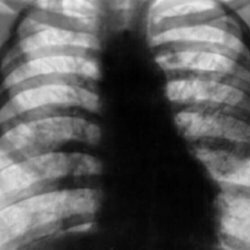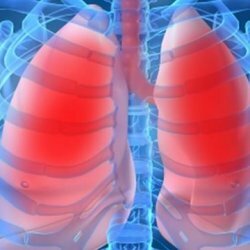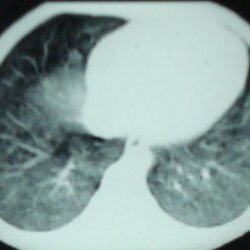Alveolitis of the lungs: symptoms, treatment and prognosis
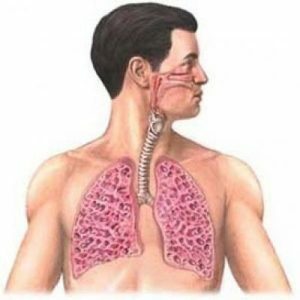
Alveolitis of the lungs is an inflammatory process that takes place in the pulmonary vesicles( they are called alveoli).This disease develops independently and is extremely rarely associated with any other pathology of the respiratory system.
Table of contents:Classification of lung alveolitis
In medicine, there are several types of the disease under consideration that have individual characteristics.
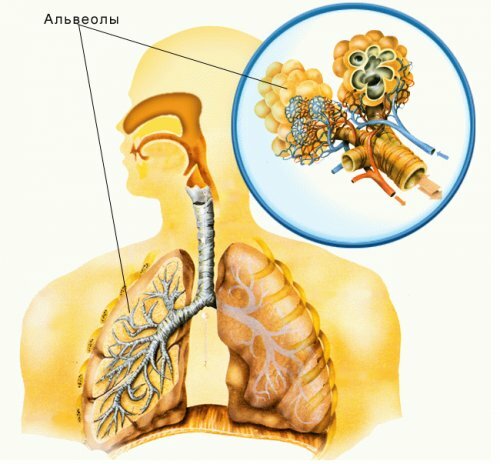
Fibrous alveolitis of idiopathic type
This type of lung alveolitis is rarely diagnosed, but doctors note that men suffer more often from this disease.Fibroziruyuschy alveolitis idiopathic type is dangerous for its complications - patients rapidly develop acute( and then chronic) respiratory failure and pneumosclerosis.
This type of lung alveolitis is diagnosed at late stages of development, since its first symptoms are nonspecific - shortness of breath and cough are often perceived by patients as signs of a cold or bronchitis. Of course, a sick person starts taking medications that actually relieve him of a cough for a short period of time.Dyspnea with fibrosing idiopathic alveolitis generally exists for a long time only during physical exertion and only at late stages - at rest.
 It is possible to diagnose fibrosing idiopathic alveolitis by radiographic examination of the lungs - in the image, changes in the pulmonary pattern and a large volume of connective tissue will be clearly visible.
It is possible to diagnose fibrosing idiopathic alveolitis by radiographic examination of the lungs - in the image, changes in the pulmonary pattern and a large volume of connective tissue will be clearly visible.
Note: the considered type of lung alveolitis in the absence of treatment for a short time leads to the death of the patient.But even if the therapy is performed correctly, there is a risk of a relapse - the patient should be accounted for all his life by a physician-pulmonologist .
Exogenous alveolitis of allergic origin
The cause of this type of disease being considered is the ingestion of irritants / allergens. It is noteworthy that exogenous allergic alveolitis often occurs in those people who have constant contact with the fur of animals, wood - irritants( dust / saliva of animals or wood dust) penetrate the body through the respiratory tract, which provokes the appearance of pathology in the pulmonary vesicles.
In medicine, distinguish acute, subacute and chronic forms of exogenous alveolitis of allergic origin.When X-ray examination, a specialist will identify blackouts in the lungs, and the transparency of these respiratory organs is significantly reduced.
Please note: can help a patient with exogenous allergic alveolitis only by excluding the irritant / allergen from his life.Otherwise, any drugs will be ineffective.
As is clear from the terminology, in this case, the inflammatory process in the pulmonary vesicles develops as a consequence of prolonged exposure to the respiratory tract of toxins.These can be drugs( sulfonamides or immunosuppressants), and chlorine, and zinc, and ammonia, that is, any toxins of a chemical type.
If a person applied for qualified medical assistance on time, and the toxins on the body were stopped, then the doctors predicted the disease in a favorable way.Otherwise, connective tissue is formed in the alveoli, and this can lead to the development of acute / chronic respiratory failure.
Symptoms of lung alveolitis
Doctors distinguish several symptoms of the disease, but not all of them are specific.
Dyspnea
It occurs almost immediately after the onset of progression of the inflammatory process in the lungs, but the patient notes it only with physical exertion.Such irregular dyspnea may occur for 3 months and only when the symptom begins to manifest itself and at rest, the patient applies for qualified medical care.
Cough
It would seem - a characteristic symptom in the pathology of the respiratory system, but that's what makes it unspecific for alveolitis.Cough in this disease does not have any specific characteristics, but can be accompanied by wheezing, if the patient is progressing along with the alveolitis and bronchitis. Never cough accompanied by discharge of bloody sputum.
Pain syndrome
 It is unstable, pain localized under the scapula or directly in the chest.At the beginning of the development of the alveolitis, they do not differ in intensity, then expressed more strongly and the patient can not take a deep breath.
It is unstable, pain localized under the scapula or directly in the chest.At the beginning of the development of the alveolitis, they do not differ in intensity, then expressed more strongly and the patient can not take a deep breath.
Since pulmonary alveolitis belongs to the group of inflammatory diseases, the patient will worsen and overall health - there may be periodic increases in body temperature, often a person is concerned about muscle pain.In addition, a patient with alveolitis of the lungs will rapidly lose weight, although no nutrition has been adjusted.
General principles of treatment of alveolitis
Alveolitis of the lungs is a pathology, the treatment of which implies an integrated approach.First of all, the patient is provided with a full-value dietary food.
Diet for alveolitis of the lungs
Despite the fact that the patient with the considered disease loses weight and rapidly loses weight, it can not be fed by force. To normalize the weight of the patient and provide adequate nutrition, it is enough to follow the recommendations of specialists:
-
 If there is an increase in body temperature, the patient will completely give up food.Permissible short-term fasting, but the patient should consume a sufficient amount of liquid - this can be pure water, loose black tea with lemon and / or broth and hips.
If there is an increase in body temperature, the patient will completely give up food.Permissible short-term fasting, but the patient should consume a sufficient amount of liquid - this can be pure water, loose black tea with lemon and / or broth and hips. - In the diet you can include broths from lean fish and low-fat meat.These products can only be eaten in boiled form, but occasionally you can offer the patient and stews.
- The optimal choice will be dairy and sour-milk products, including cereals, and soups.
- In the diet of a patient with alveolitis of the lungs fresh fruit should be present, but only in a grinded or chopped form.
- Carrots, beet, apple and orange juice are allowed, but they must be prepared immediately before use.
- A patient with alveolitis of the lungs can consume honey, sea buckthorn, black currant, various dried fruits.
Such power restrictions will remain in effect until the doctors mark a steady positive trend.
Drug therapy
Any medicines for the treatment of lung alveolitis are selected by the physician in a strictly individual order. There are, of course, general principles of the choice of medicines:
- Glucocorticoids are prescribed for diagnosis of fibrosing alveolitis of idiopathic type.If you do not start therapy with these drugs, then the connective tissue will expand rapidly, which will soon lead to a fatal outcome.In some cases, glucocorticoids do not give the desired effect and then they are replaced by immunosuppressants and penicillamine.
- Treatment of allergic and toxic alveolitis implies the appointment of glucocorticosteroids, but only after the irritant / cause of the disease has been excluded from the life of the patient.
- Dexamethasone, which has anti-inflammatory and anti-histamine properties, acts as an auxiliary drug in the treatment of lung alveolitis.
- To facilitate the work of the respiratory system and improve it, patients are prescribed Aminophylline.
Note: treatment of any type of lung alveolitis of any kind at home is not practiced, although with the permission of a specialist it is allowed.A full recovery in fibrosing alveolitis of the lungs is not possible, therefore the patient is discharged home after the acute symptoms have been eliminated, where the treatment continues for a lifetime.
Traditional medicine
Alveolitis of the lung is a disease in the treatment of which can be successfully used and funds from the category of "traditional medicine". The most popular folk remedies that are used to treat pulmonary alveolitis are:
-
 Leaf of cowberry ordinary.This plant has pronounced antiseptic properties, which helps to stop the inflammatory process and accelerate recovery.It is necessary to take 20 grams of vegetable raw materials, chop and pour 300 ml of steep boiling water.The agent is insisted for half an hour, the loan is filtered.The received volume of infusion is intended for daily intake - it should be drunk in small portions, but throughout the day.
Leaf of cowberry ordinary.This plant has pronounced antiseptic properties, which helps to stop the inflammatory process and accelerate recovery.It is necessary to take 20 grams of vegetable raw materials, chop and pour 300 ml of steep boiling water.The agent is insisted for half an hour, the loan is filtered.The received volume of infusion is intended for daily intake - it should be drunk in small portions, but throughout the day. - Pumpkin juice.It is not only a delicious drink, but also a useful substance that prevents the development of pulmonary edema.If the patient does not have contraindications to the use of pumpkin juice, then he needs to drink 500 ml per day.Pumpkin juice provides the body with all the necessary vitamins and microelements, which causes the strengthening of immunity.
- Birch buds.They are taken in quantities of 40 grams and poured with boiling water( not more than 500 ml), insist 60-90 minutes.Then the drug must be filtered and consumed throughout the day in equal doses before meals.If desired, you can replace the birch buds on the leaves of the same tree, or take the specified parts of the tree in equal proportions.
- Flaxseeds.This remedy is especially effective when there is fluid accumulation in the lungs.And to prepare the medicine you need to take 2 tablespoons of flaxseed, pour a liter of water and bring to a boil over low heat.Insisted for 50 minutes, then filtered and used half a cup in a warm form every three hours.It must be remembered that this folk remedy is allowed to eat no more than 6 times in ducks.
Treatment with folk remedies should in no case be a priority in the treatment of alveolitis of the lungs! These are just aids that provide strong immunity and accelerate recovery.But without medications the treatment of the disease in question will never be effective.
Alveolitis of the lungs is a pathology that poses a certain danger to human life.Timely it can be diagnosed only if the patient himself, when the first signs appear, applies for qualified medical care.In this case, treatment will be successful, and doctors, as a rule, make favorable prognosis for the alveolitis.
Tsygankova Yana Aleksandrovna, medical reviewer, therapeutist of the highest qualification category

